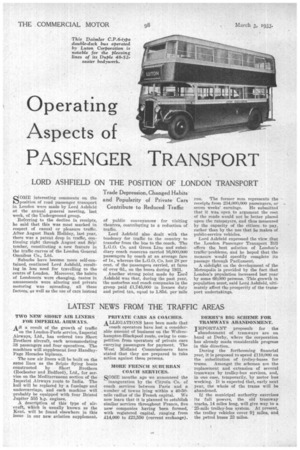Operating Aspects of PASSENGER TRANSPORT
Page 60

If you've noticed an error in this article please click here to report it so we can fix it.
LORD ASHFIELD ON THE POSITION OF LONDON TRANSPORT
Trade Depression, Changed Habits and Popularity of Private Cars Contribute to Reduced Traffic
1.3 OMB interesting comments on the
position of road passenger transport in London were made by Lord Ashfield at the annual general meeting, last week, of the Underground group.
Referring to the decline in receipts, he said that this was most marked in respect of casual or pleasure traffic. After August Bank Holiday, last year, there was a patent drop in traffic, continuing right through August and Se-p'tember, constituting a new feature in the traffic curves of the London General Omnibus Co., Ltd.
'Suburbs have become more self-contained, continued Lord Ashfield, resulting in less need for travelling to the centre of Loudon. Moreover, the habits of Londoners were changing, tastes in amusements were altering and private motoring was spreading, all these factors, as well as the use a cars instead
of public conveyances for visiting theatres, contrihnting to a reduction of traffic.
Lord Ashfield also dealt with the tendency for traffic to the country to transfer from the bus to the coach. The L.G.O. Co. and Green Line and subsidiary coach concerns carried 16,000,000 Passengers by coach at an average fare of ls., whereas the L.G.O. Co. lost 28 per cent, of the passengers carried, at fares of over fid., on the buses during 1931. , Another strong point made by Lora Ashfield was that, during the past year, the motorbus and coach companies in the group paid £1,745,000 in licence duty and petrol tax, equal to 1.85d. per mile
run. The former gam represents the receipts from 234,000,000 passengers, or seven weeks' earnings. He submitted that it was open to argument the cost of the roads would not be better placed upon the ratepayers, and thus measured by the capacity of the citizen to pay, rather than by the use that he makes of public-service vehicles.
Lord Ashfield expressed the view that the London Passenger Transport Bill offers the best solution of London's trafficproblems, and he hoped that the measure would speedily complete its passage through Parliament.
A sidelight on the development of the Metropolis is provided by the fact that London's population increased last year by some 60,000 persons. This growth in population must, said Lord Ashfield, ultimately affect the prosperity of the transport undertakings.




































































































